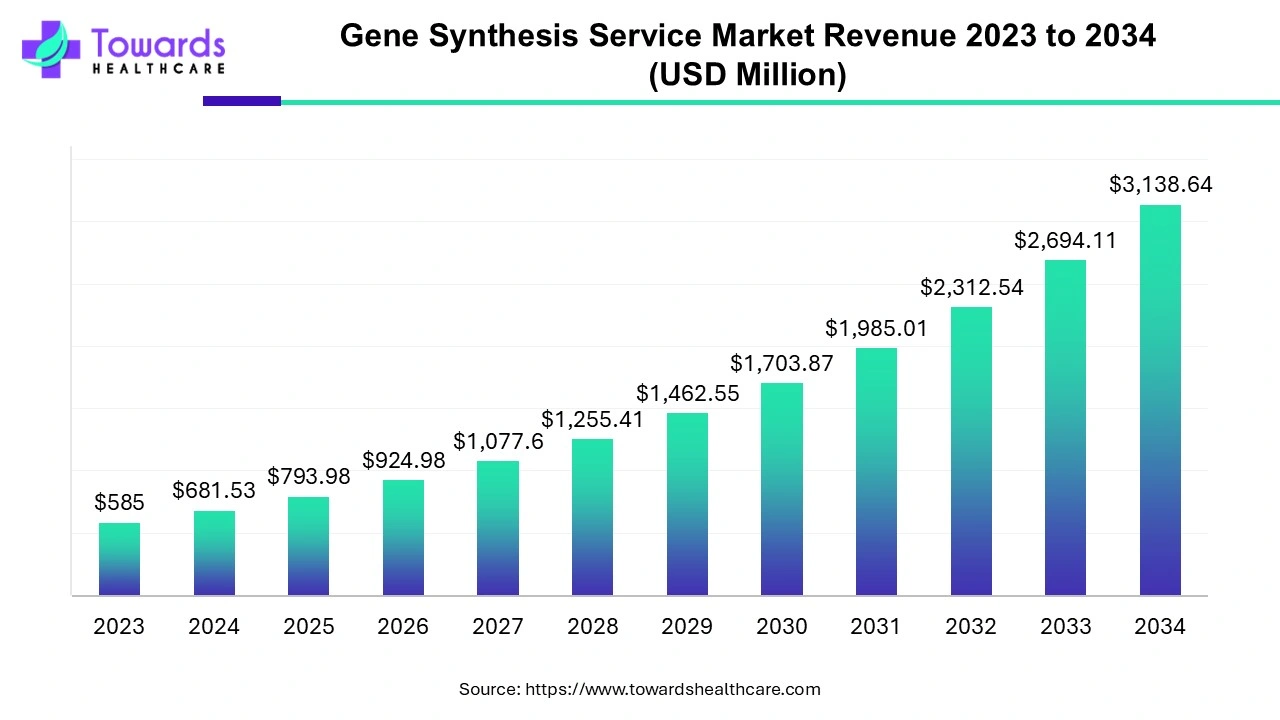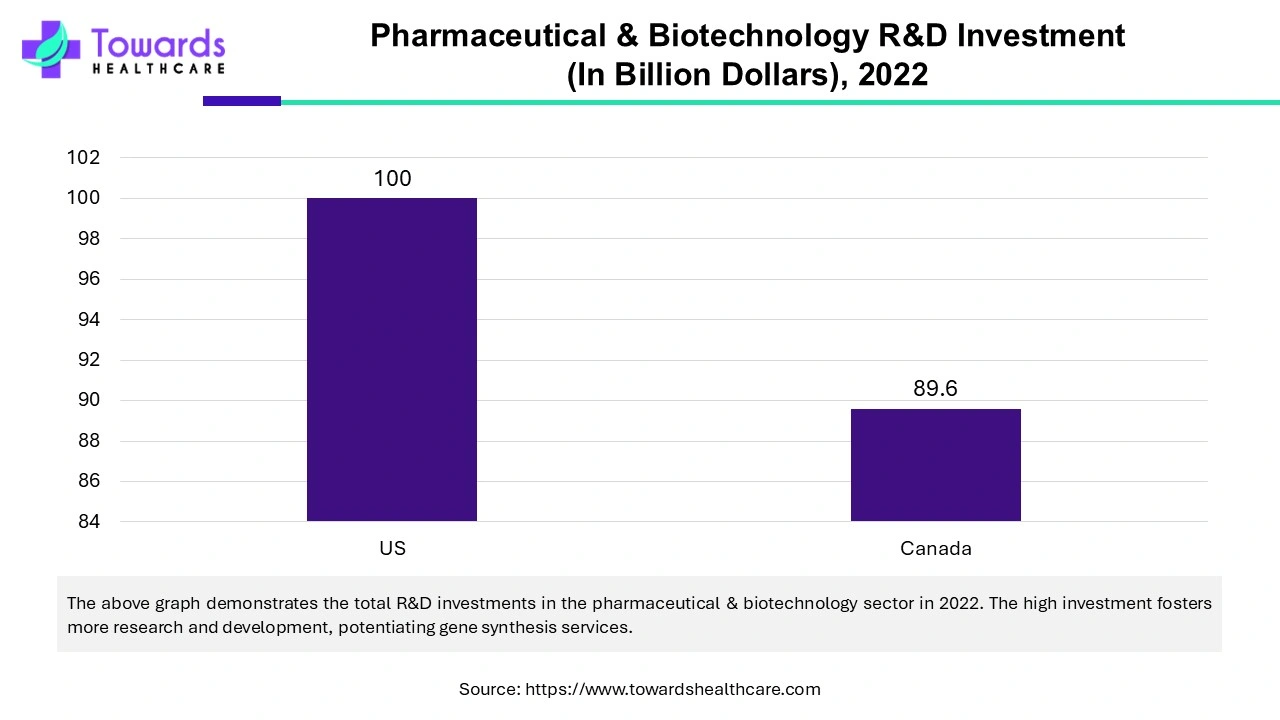January 2026

The gene synthesis service market was estimated at US$ 585 million in 2023 and is projected to grow to US$ 3138.64 million by 2034, rising at a compound annual growth rate (CAGR) of 16.5% from 2024 to 2034.

Gene synthesis is the process of chemically synthesizing a strand of DNA, RNA, and other oligonucleotides base-by-base. A DNA sequence can be synthesized, including sequences that do not exist in nature or generate variants of naturally occurring sequences. Researchers employ synthetic genes to investigate a wide range of biological functions that nucleic acids perform, including mediating cell-cell communications, encoding proteins, controlling gene expression in the nucleus, and forming biofilms from extracellular DNA. Gene synthesis services refer to providing custom-cloned gene sequences for optimal protein expression. The services save researchers time and allow researchers to focus on functional studies.
The rising incidences of chronic disorders like cancer and viral and infectious diseases drive the market. Gene synthesis techniques are used to engineer, detect, and identify genomes of these disorders. Also, newly identified viral genomes can be synthesized for vaccine development. Additionally, the growing research and development activities and increasing investments in biotechnology boost the market.
The huge demand for vaccine development, cancer immunotherapy, gene therapy, etc., leads to growing research and development for gene synthesis. The rising incidences of cancer and viral disorders potentiate the market. The most common research topic worldwide is developing cancer treatments and vaccines for viral diseases. The demand for faster research outcomes also promotes gene synthesis services. Many pharmaceutical and biotechnology companies collaborate with gene synthesis service providers to streamline their research workflow with accurate and faster results. Gene synthesis is widely used for antibody, recombinant protein, and ELISA Assay test kit productions. The rapid innovations in gene therapy augment the gene synthesis market. Synthetic genes can be designed to replace defective genes or introduce new functions into cells, enabling the production of high-quality, custom DNA sequences. Several companies invest heavily in R&D to drive sustainable growth, enhance global presence, and continue their leadership in technology.
The major challenge of the market is the maintenance of appropriate quality and reliability of both the product and process. This hampers the reproducibility of the research results, thereby limiting its use in commercial applications. Major errors like synthesis errors, sequence errors, or contamination can pose significant challenges. Another major challenge is the high initial cost of the gene synthesis service. The service provider requires favorable infrastructure and specialized equipment for gene synthesis.
North America dominated the gene synthesis service market in 2023. The state-of-the-art research and development facilities, increasing investments, and presence of key players drive the market. Countries like the US and Canada have advanced pharmaceutical and biotechnology companies promoting market growth. Biotechnology R&D accounted for 17% of the total US business R&D in 2021. The majority of the gene synthesis revenue globally comes from major companies in the US. As of 2021, the government of Canada invested over $1.2 billion to rebuild Canada’s vaccine, therapeutics, and bio-manufacturing capacity. In 2024, the Ontario government announced an investment of $40 million to help local life sciences companies, supporting a majority of the pharmaceutical & biotechnology companies in the city.

Asia-Pacific is anticipated to grow fastest in the gene synthesis service market during the forecast period. The growing research & development facilities, increasing investments & collaborations, and rising demand for gene synthesis drive the market. Countries like China, India, and Japan are at the forefront of boosting the gene synthesis market. India is among the top 12 destinations for biotechnology worldwide and the third largest destination for biotechnology in Asia-Pacific. Chinese biotech sector supports innovation in the field with a growing number of novel Chinese drugs, a rise in R&D companies, an increase in out-licensing deals from small Chinese biotech companies, particularly in oncology, and a surge in clinical trials. Additionally, the rising incidences of oncology, viral disorders, and infectious disorders augment the market.
By type, the below 1000 bp segment held a dominant presence in the gene synthesis service market in 2023. Gene sequences of less than 1000 bp are widely preferred as they have a small length and can be easily incorporated into a plasmid for further replication. Additionally, the preparation of shorter gene sequences requires less time. Hence, they are delivered quickly to the customer due to a lesser average turnaround time than longer gene sequences.
By application, the commercial segment led the global gene synthesis service market in 2023. Gene synthesis is commercially used in preparing therapeutic antibodies, neuroscience research, cancer biology, genetic engineering, vaccine design, and plant biology research. Favorable infrastructure and high investment augment the segment growth. Also, commercial segments have advanced research & development facilities with advanced specialized equipment, and the demand for faster and more accurate research outcomes potentiates the demand for gene synthesis services.
The academic research segment is estimated to grow significantly in the gene synthesis service market during the forecast period. The lack of appropriate facilities for gene synthesis and trained professionals demand gene synthesis services.
By Type
By Application
By Region
January 2026
January 2026
January 2026
January 2026